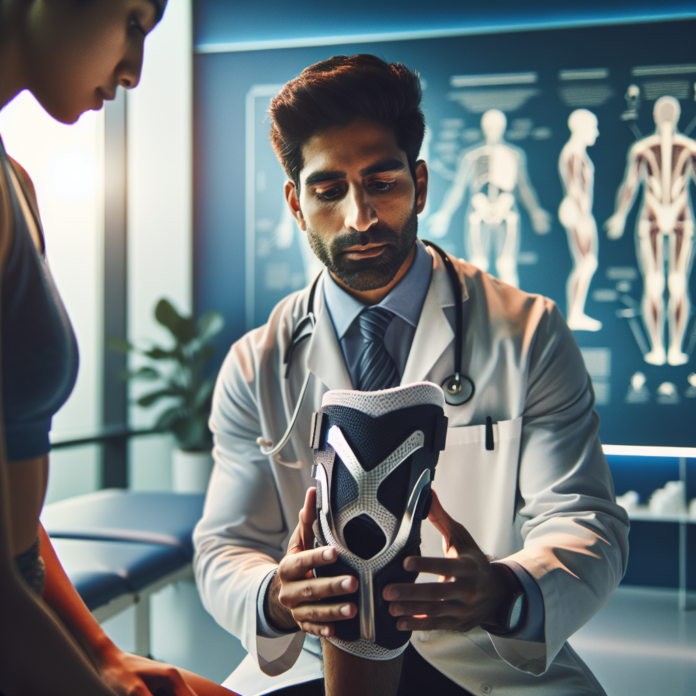Recovering from an ACL injury is a significant hurdle for athletes, and the journey back to peak performance is often fraught with concerns about re-injury. As athletes and enthusiasts alike seek ways to safeguard their knees after such a transformative procedure, the role of custom knee braces comes into sharp focus. Dr. David Guy, an esteemed orthopedic surgeon and sports medicine specialist, delves into this pressing issue in one of his insightful “Ask the Doctor” video series. With his extensive expertise in both regenerative medicine and sports injury prevention, Dr. Guy explores whether these custom-fit braces can indeed offer a buffer against further ACL damage. Join us as we unravel his expert insights and examine the potential benefits of these protective aids, equipping you with the knowledge to make informed decisions about your post-surgery journey.
The Role of Custom Knee Braces in ACL Injury Prevention
The anterior cruciate ligament (ACL) is a critical component of knee stability, and an injury to it can be devastating for athletes. Rehabilitation after ACL reconstruction surgery is an arduous process, and athletes often face looming fears of re-injury once they return to their sport. Knee braces have been introduced as potential tools to mitigate this risk, particularly custom ACL braces designed specifically for the individual’s anatomical needs and alignment.
Custom knee braces, such as those made by companies like Donjoy and Breg, are crafted based on meticulous measurements of the patient’s knee. This personalized approach ensures that the brace provides optimal support by aligning the forces on the knee with the individual’s unique anatomy. Such braces are particularly useful during athletic activities where the knee might be subjected to excessive stress. This targeted support could potentially help in reducing the risk of re-injury, although it is not an infallible safeguard.
Key Benefits of Custom Knee Braces
- Targeted Support: Custom braces provide support tailored to the user’s specific knee anatomy, addressing individual mechanical needs.
- Enhanced Stability: By providing the necessary stability, these braces can help athletes feel more confident during high-demand sports activities.
- Reduced Risk: While not eliminating the risk entirely, they can decrease the likelihood of re-injury by offering additional external support to the knee structure.
Interestingly, custom ACL braces are not only used post-injury but are also commonly seen in preventive scenarios, such as in the NFL. Offensive linemen often wear these braces despite not having suffered an ACL tear. The braces serve a preventive function, providing an extra layer of protection against potential knee injuries, including medial collateral ligament (MCL) injuries.
However, it is crucial to differentiate between custom-made braces and off-the-shelf varieties available at drugstores or sporting goods shops. The latter category lacks the bespoke adjustments necessary to truly benefit the knee post-ACL reconstruction. Generic braces are unlikely to provide the specific support needed for such a nuanced condition, and athletes should not rely on them to prevent re-injury.
A Comprehensive Strategy for ACL Recovery
Dr. Guy emphasizes that while custom braces can contribute to a lowered risk of injury, they do not eliminate it entirely. They are an additional tool in an athlete’s arsenal, complementing other preventive strategies such as physical therapy and proper conditioning. Athletes should continuously work on strengthening exercises tailored to the lower extremities and maintain a steady focus on improving balance and neuromuscular control.
For those seeking alternatives to surgical interventions or corticosteroid shots, Dr. Guy encourages exploring regenerative medicine options. These innovative approaches may offer viable solutions for enhancing recovery and preventing injuries without invasive procedures. As an expert in regenerative medicine, Dr. Guy offers insights into these possibilities, aiming to broaden patients’ options for recovery and performance enhancement.
Moreover, athletes are encouraged to stay informed and actively participate in discussions about their health and recovery options. Engaging with professionals, like Dr. Guy, through consultations or educational content, can offer invaluable perspectives and potential strategies that align with an individual’s unique needs and circumstances.
Community Engagement and Shared Experiences
For athletes and individuals with orthopedic injuries, sharing personal experiences and queries can cultivate a supportive community. Dr. Guy welcomes audiences to share their stories and questions in the comments of his educational videos. Although direct medical advice cannot be provided in this format, these interactions foster a dialogue that may address widespread concerns in future educational content.
In summary, while custom knee braces offer promising support for athletes recovering from ACL surgery, they are just one piece of a comprehensive strategy to prevent re-injury. Athletes should invest in custom-fit solutions, engage in targeted physical rehabilitation exercises, and consider alternative treatment methods to enhance their recovery and performance. By staying informed and proactive, athletes can optimize their post-surgery journey, minimizing the risk of re-injury and maximizing their potential on the field.
